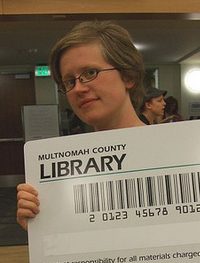Kelly McElroy

Dual MAS/MLIS 2010
Kelly McElroy immersed herself in the science and theory of archives and information in her dual masters programs at UBC’s School of Library, Archival and Information Studies. However, it was during her Co-op term at the Washington State Archives that she came across a report that, to her, “validated the importance of archival theory and was a glorious demonstration of how theory gets applied in real life.”
During her work term at the Washington State Archives, Kelly came across the report of the National Archives’ reappraisal of FBI records in the 1980s. The previous semester, she had written a term paper on the enormous reappraisal project and the questions it raised about archival theory. After being unable to find the report anywhere else, Kelly says, “It was so amazing to see it there, being used as reference in the state archives.” This serendipitous moment was just one of the instances when Co-op gave her a chance to apply the theory she had learned in her classes.
After cataloguing photographs for public access as the Washington State Archives’ Digital Archives Co-op student, Kelly then did a work term with the Columbia Basin Trust. Kelly coordinated the creation of a subject-based digital library, locating documents and securing copyright permission for inclusion in the library. Because both of her work terms “showcased the centrality of digital materials,” Kelly realized that “the key to providing greater access to collections often lies in the world wide web.” Yet another example of theory application was Kelly’s opportunity to learn firsthand about copyright. “It was thrilling to discuss the copyright permissions documents I had crafted with a lawyer specializing in intellectual property – reading about copyright is one thing and applying the laws is another.”
Kelly knows that there is much more to Co-op than the application of theory. “The most valuable skills I developed as a Co-op student,” she says, “were personal and professional.” She appreciated being treated as a colleague by other professionals. She adds, “Playing an active role in daily activities that make up the mortar of the workplace and contributing to practical solutions can only be learned by doing.”
“If you’re not sure if you want to be a cataloguer or a records manager,” Kelly advises prospective students, “a co-op work term is a great way to test out a particular area of the profession.” Kelly has continued to build on her professional experience and confidence in her skills doing contract work with the Columbia Basin Trust to carry out the project she began during her co-op term after graduation.
Kelly McElroy



Dual MAS/MLIS 2010
Kelly McElroy immersed herself in the science and theory of archives and information in her dual masters programs at UBC’s School of Library, Archival and Information Studies. However, it was during her Co-op term at the Washington State Archives that she came across a report that, to her, “validated the importance of archival theory and was a glorious demonstration of how theory gets applied in real life.”
During her work term at the Washington State Archives, Kelly came across the report of the National Archives’ reappraisal of FBI records in the 1980s. The previous semester, she had written a term paper on the enormous reappraisal project and the questions it raised about archival theory. After being unable to find the report anywhere else, Kelly says, “It was so amazing to see it there, being used as reference in the state archives.” This serendipitous moment was just one of the instances when Co-op gave her a chance to apply the theory she had learned in her classes.
After cataloguing photographs for public access as the Washington State Archives’ Digital Archives Co-op student, Kelly then did a work term with the Columbia Basin Trust. Kelly coordinated the creation of a subject-based digital library, locating documents and securing copyright permission for inclusion in the library. Because both of her work terms “showcased the centrality of digital materials,” Kelly realized that “the key to providing greater access to collections often lies in the world wide web.” Yet another example of theory application was Kelly’s opportunity to learn firsthand about copyright. “It was thrilling to discuss the copyright permissions documents I had crafted with a lawyer specializing in intellectual property – reading about copyright is one thing and applying the laws is another.”
Kelly knows that there is much more to Co-op than the application of theory. “The most valuable skills I developed as a Co-op student,” she says, “were personal and professional.” She appreciated being treated as a colleague by other professionals. She adds, “Playing an active role in daily activities that make up the mortar of the workplace and contributing to practical solutions can only be learned by doing.”
“If you’re not sure if you want to be a cataloguer or a records manager,” Kelly advises prospective students, “a co-op work term is a great way to test out a particular area of the profession.” Kelly has continued to build on her professional experience and confidence in her skills doing contract work with the Columbia Basin Trust to carry out the project she began during her co-op term after graduation.